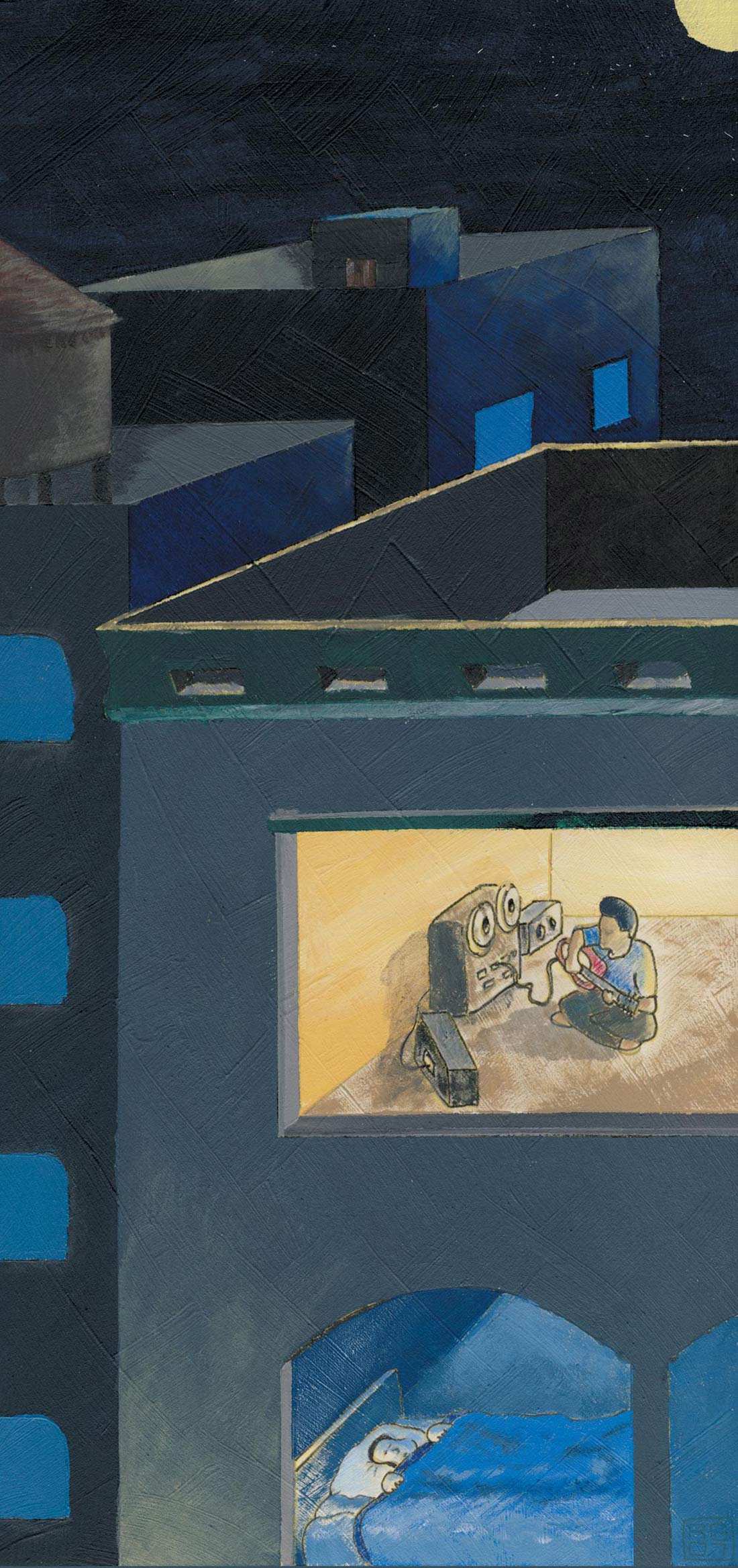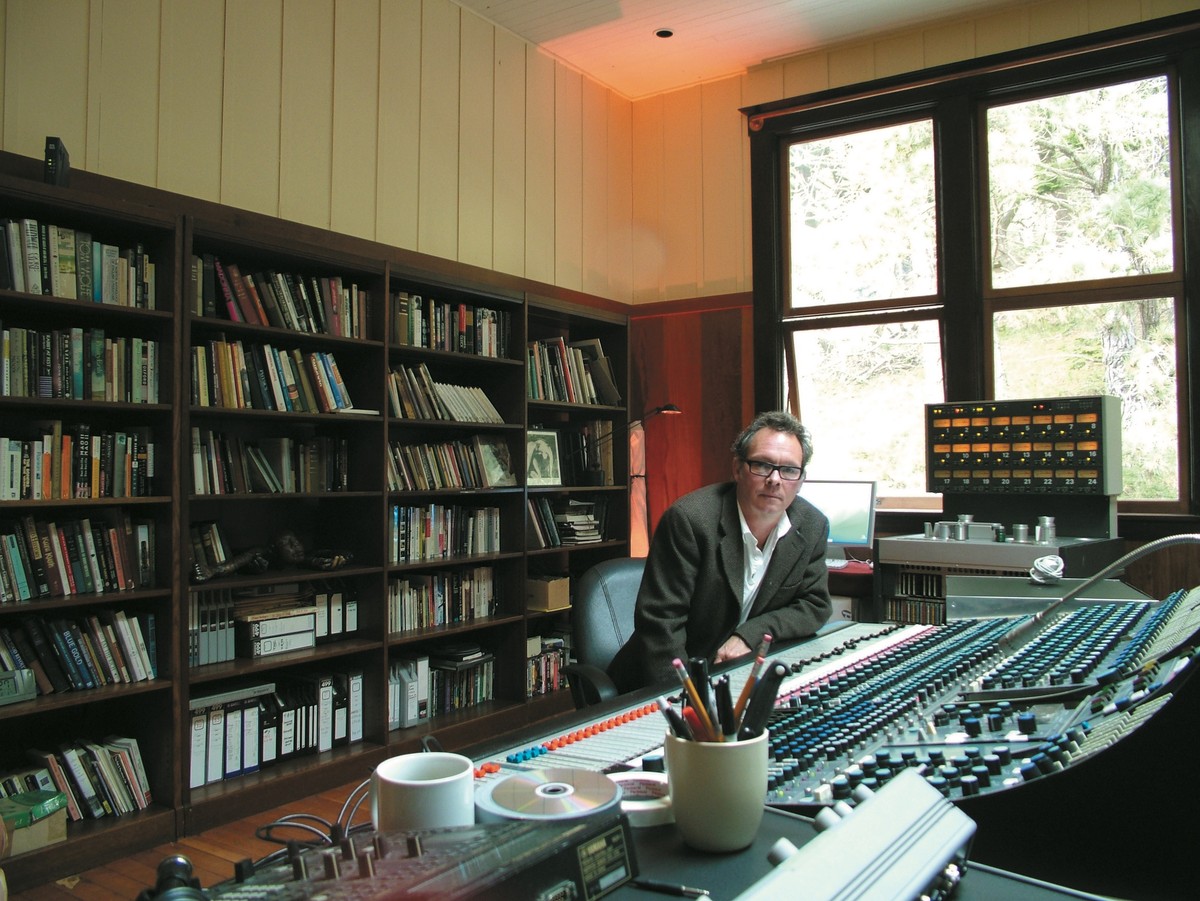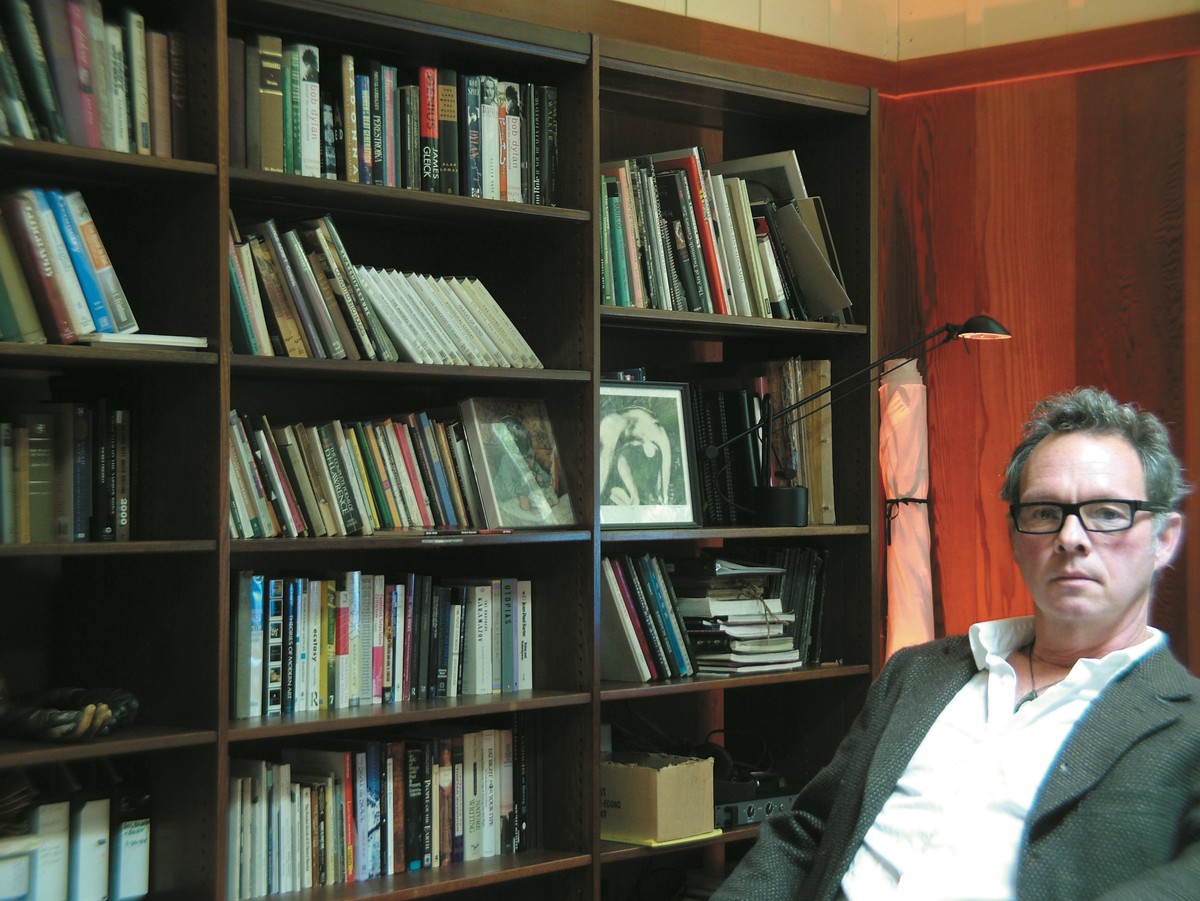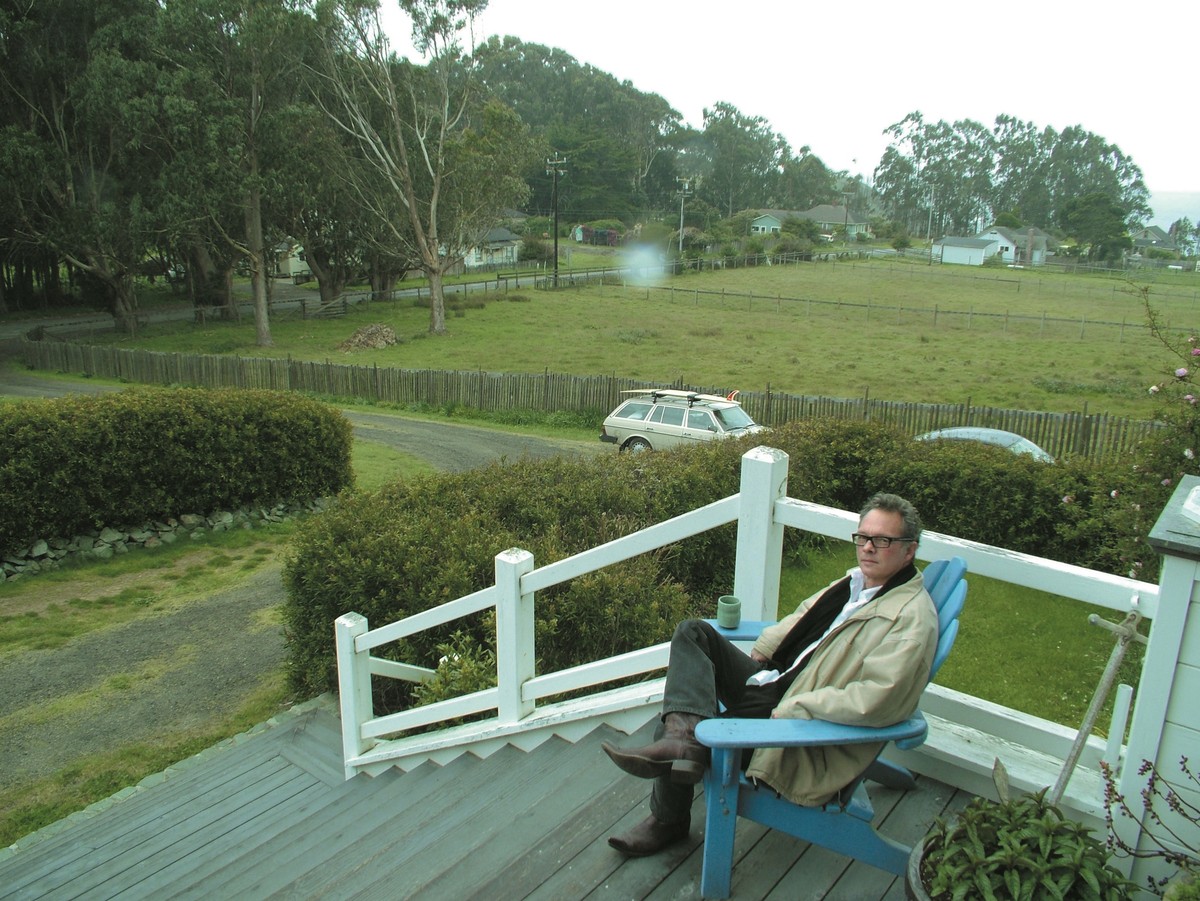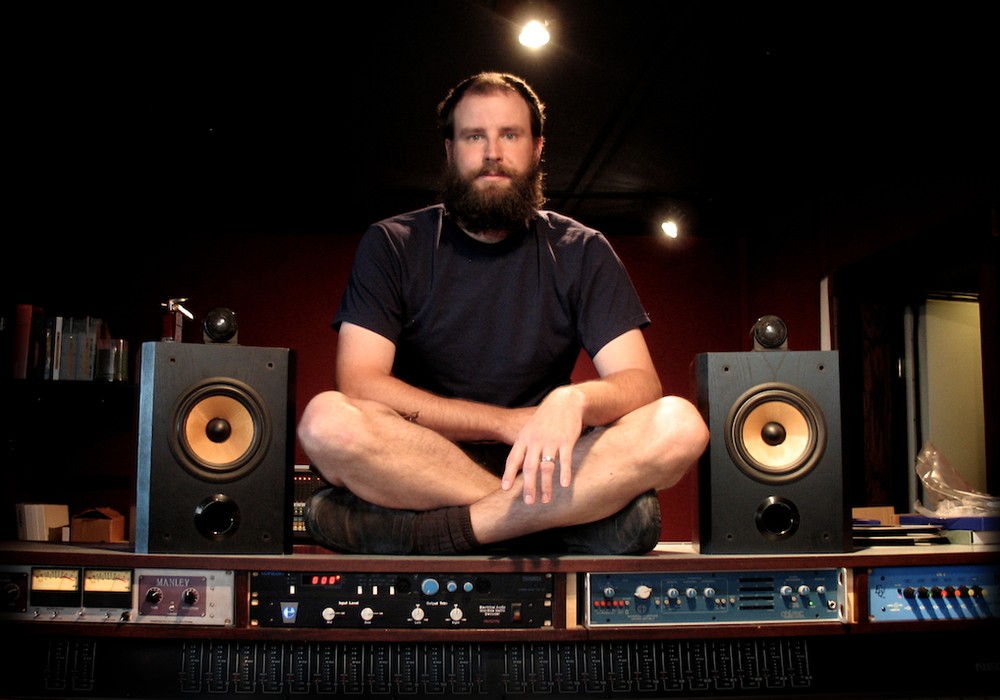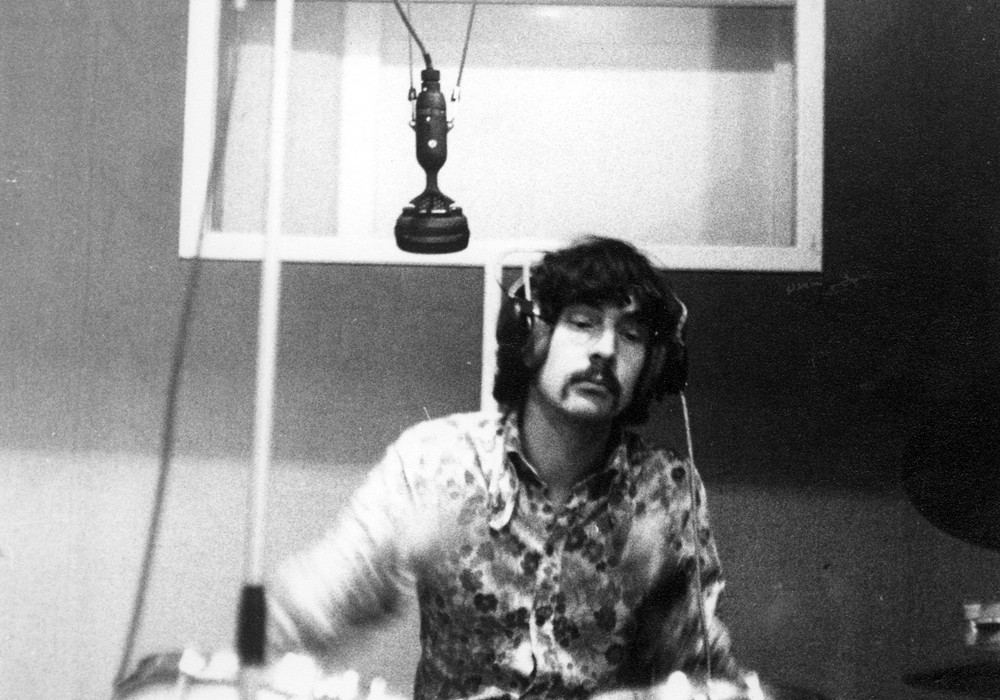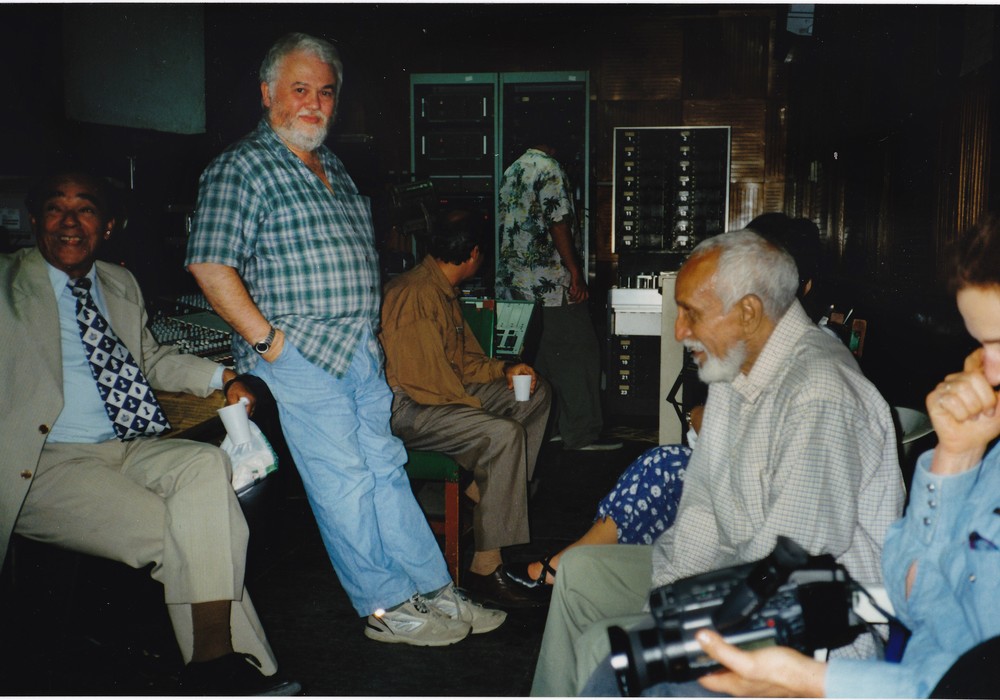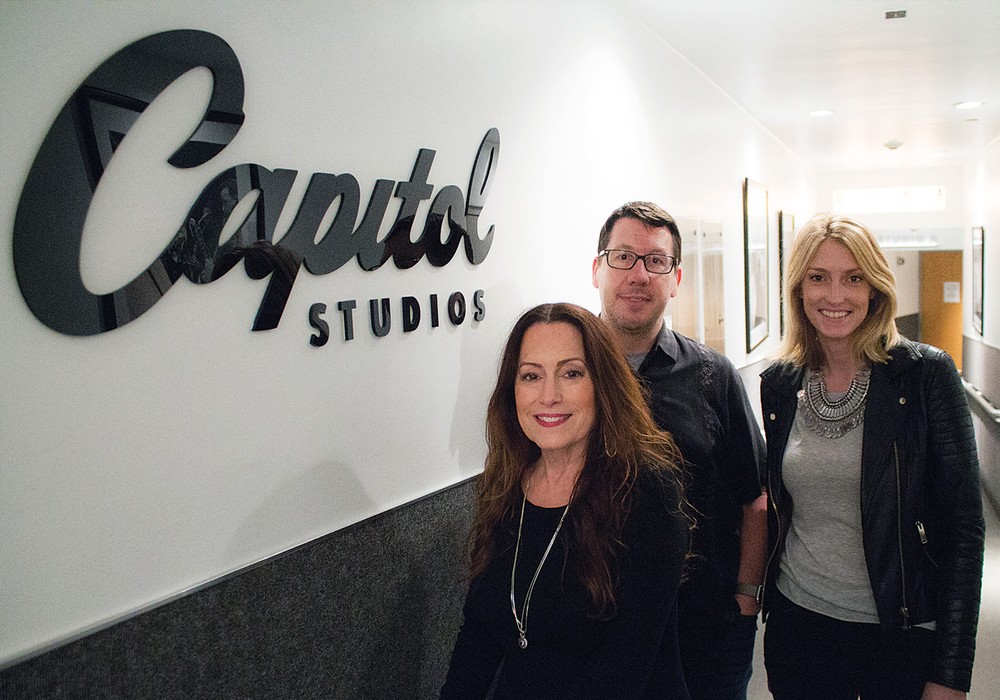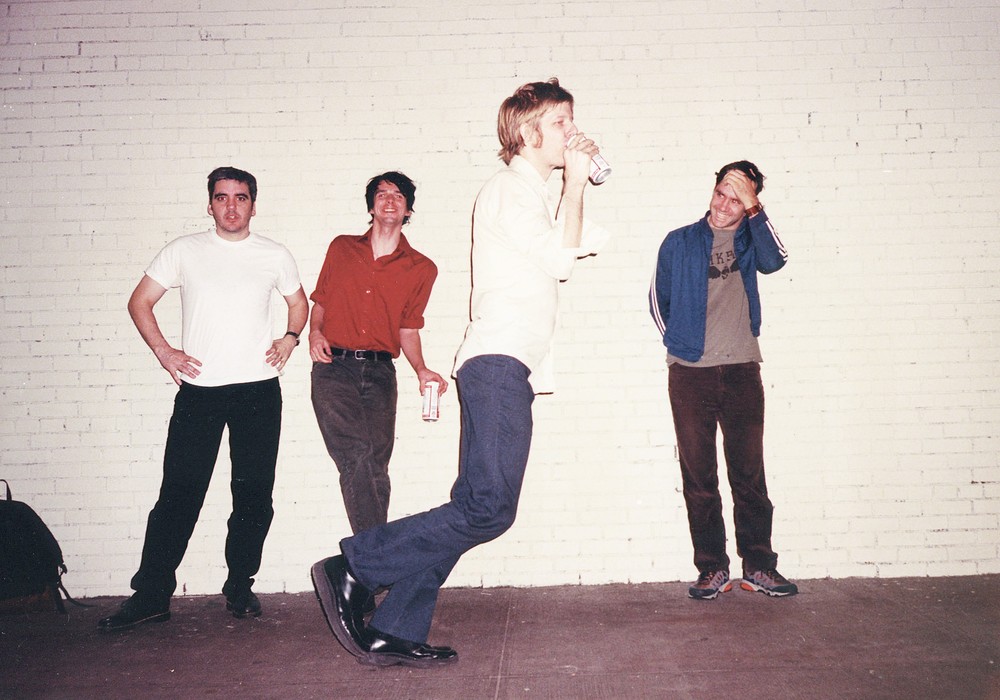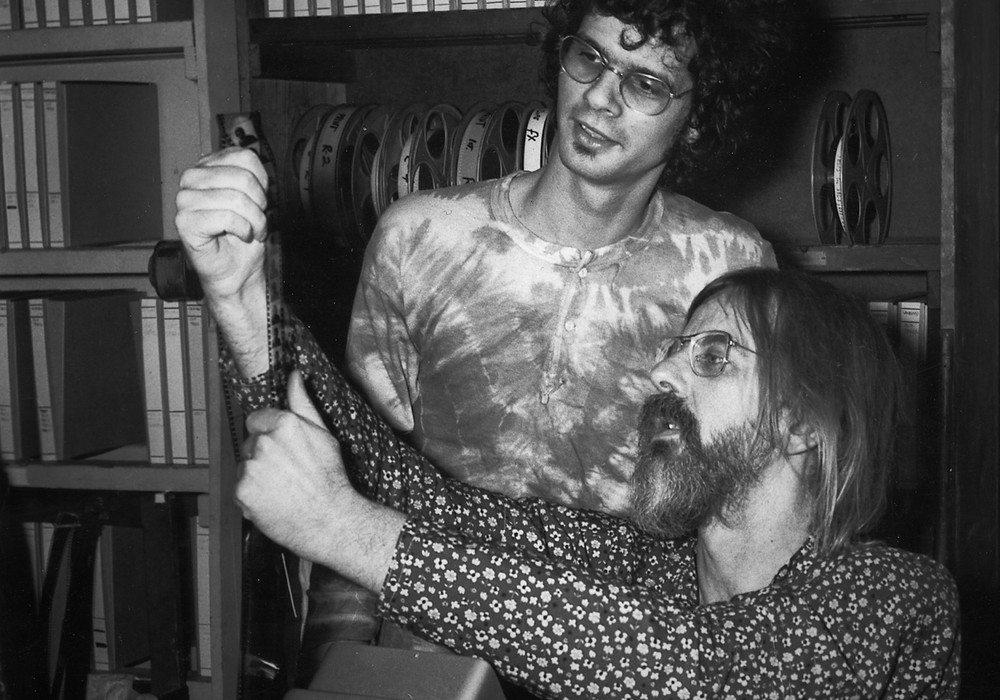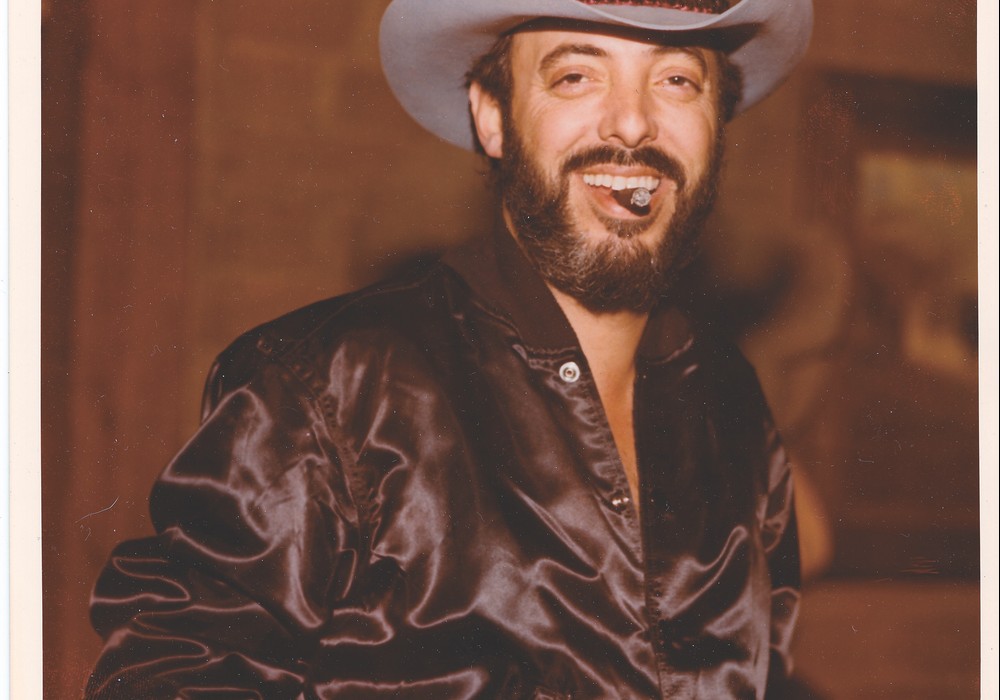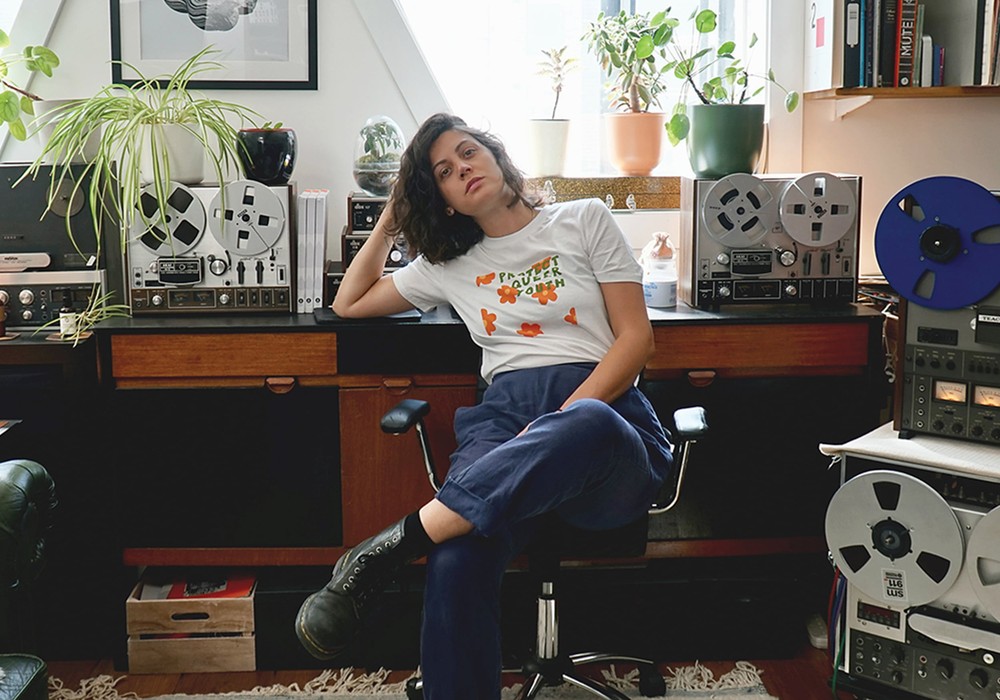Who's the producer/engineer with a resume featuring Rosanne Cash, Annie Stela, Van Hunt, Sheryl Crow, Michael Jackson, Madonna, Sierra Swan, Five For Fighting, Lisa Germano, Tom Petty, Traveling Wilburys and ELO? Bill Bottrell is. Matt's interview with Bill is one of the most straight-shooting, no-holds- barred pieces I've seen in a long while. From a kid entering a studio at 14 in a band to a successful career, he's seen it all and has many thoughts about the world of recording. -LC
How did you start in studios?
In junior high school I had a rock band. I think I was fourteen years old or something and we had a little rock band and somebody heard it and wanted to pay for us to record. They paid for us to go down to a recording studio in East Hollywood and record a single. Years later after I quit college and didn't know what I was going to do, I was working in a warehouse and I decided to get in my car and go down there and knock on the door at the same studio where I had worked in junior high and ask for a job.
What year was that?
That was '74. It was a two-man operation at the time — the owner [Del Kasher] and an engineer named Dave Holman. I think they wanted help of some sort, but I did a lot of painting of walls and cleaning of attics and also did sessions — simple sessions — voice-overs, things like that. They just threw me into it. I had sort of built my own studio at the warehouse where I worked anyway. It was a very funky, thrown together thing, but I did know signal paths and electronics and I was always the geek in the rock band.
In today's recording world, somebody coming up wanting to be an engineer/producer has a lot of information available to them. In '74, where did you turn to learn?
The first school for recording arts had been started and I can't remember the name of it, but I signed up for it, just about the same week I went down and got my job at the recording studio — California Recording Studio. The job at the studio obviously took precedence in my mind and of course they wanted to utilize me to the fullest, so I ended up working more there than going to the classes.
Did you feel that you learned more from being at the studio than taking the classes?
Yeah I did, and all the technical stuff — it was pretty "electronic education and magnetic things and the tape recorder theory" and stuff like that and I already knew — just from being a kid and tearing things apart. I learned a lot there. Del Kasher, taught me a lot. We still had tube gear then, and as a twenty- one year old I didn't really appreciate having the antique gear. Del is a guitar player and he loves the tube sound — we had tube mono Ampex tape machines, stereo tape machines and a 3M 8-track. I spent my time there wishing he would update his equipment, but I did get to use the old stuff and came to appreciate it many years later.
And at what point did you jump from those kind of meat and potatoes type of recording gigs?
I sort of moved up the food chain of recording studios in 1978 — found this guy, Buddy King, who had just built Soundcastle Recording in Silverlake. He was pretty much all alone there and he didn't know what he was going to do, and he was desperate for an engineer/do-it-all/chief tech/whatever kind of person and he hired me. That was a more contemporary recording studio and was, I would say, more open for business than California had been, which was more of a sort of vanity studio for Del. Big clients started coming in there and mostly they would bring their own engineer and I would provide them with what they needed. We wanted to be the most sought-after studio in L.A. and we set out to try and do that. Eventually, people started coming in without an engineer and they got me, so it kind of went like that. It's always little steps. I got sort of famous in L.A. with the L.A. R & B crowd. They used to like to come in and make their records and have me engineer. Somewhere along there Jeff Lynne came in, finishing an ELO album, and he had an idea for a new song. He was in L.A. and most of the album was done in Europe, but was looking for a studio with a Harrison console and such and such monitors and that was us - so he showed up. I had been a Move and Electric Light Orchestra (in their first two albums) fan. Jeff shows up and I just dialed the stuff in before he even got there. I knew what he liked. He came in and was blown away. Next time he made a record he took me out to Europe and I engineered the whole thing.
He just called you up and said, "Come on Bill, let's go to Europe?"
Yes. That's what people hoped for who were working at studios, to have some launching pad to go freelance. That's when I went freelance. That was in '82.
Now, when Jeff Lynne calls you up, do you say, "Great, I want to make this much money and here's how I want to do it", or do you just go with the flow?
You go with the flow. I took what he offered which was way more than what I was making. There's a concept that's kind of been lost in the last fifteen, twenty years where hierarchies and pyramids do exist, and if you're at the bottom and you want to move up, you got to eat it a little bit. You don't walk in at the bottom of the pyramid and start making demands. First you establish the value that you bring. You show what you can do and later on you make demands. You prove that they can't do without you and then you stick it to them. [laughs]
Looking at your discography I see The Traveling Wilburys later on down the line. Did Jeff call you for that?
Yeah. I continued to engineer for Jeff for years. When I got home from that first gig in Europe, the L.A. R & B scene was still waiting for me. The Jackson brothers, including Michael, started showing up and they liked what I did. For several years I went with one foot in the Jackson's world and one foot in the Jeff Lynne world. It was great for me — the learning and diversity was unbelievable. I never had a manager. I never dealt with a record company person. I had artists calling me. They would get my number from another artist or whatnot and it was a one-to-one relationship with the artist always — up until '95, I guess.
In most interviews the technical and production elements are discussed but not the business side. I think there's many of us in the indie world that are still baffled by the business and how that works.
I think a lot of it is psychology — not business. In perceptions, and I guess business is perceptions, is marketing and promotion and everything. But it's changed immensely since say, '85, '87, '90. It's a geometric curve of revolution in this industry. With thirty years of experience, I can't negotiate the business climate anymore either. It's absolutely hopeless. Nobody is stepping up with any courage or dealing on behalf of the music or the musicians or the artists. Everybody is out for a killing. Everybody's trying to hook on to something that seems like it might be cool or profitable and everybody's guessing.
Do you find that the thirty years of experience and track record you have carries weight when you walk through the door — that you don't get messed with financially as much as say, somebody with less experience?
I do believe there's an element of that, yeah. Just a bit of notoriety or past track record does help.
At what point did you get a manager and at what point did you feel that that was necessary?
I never thought it was necessary. I've tried a couple of managers over the years and I still don't have a manager. My long-time lawyer handles my affairs and I call him my manager and he calls himself my manager, but he knows what not to do and what to do. He's watched the other managers come and go. My problem with them was that they mainly wanted to hook me up with gigs that fell into their lap, and I don't like to hook up with gigs that way. I like them to happen organically where there's a connection between the artist and myself. What I really needed a manager for was to look out for me financially and business-wise and help with the minutiae, and they didn't seem to want to do that.
They just wanted to pass the gigs on really quick and take a commission?
Yes. Regardless of anything else — whether anyone enjoyed the music or whether I enjoyed doing the gig or the artist hated me — they didn't care. "Just keep taking the gigs. Take the fees. Don't worry about royalties. You can take enough gigs that we'll all get rich."
Explain to the readers how a producer back then and even now makes money.
Well, I guess back then and now it's the same, with one slight difference that I'll get to. You go in and you get points. When I started it was pretty standard to get four points of retail, figured the same way that the artist's royalty is figured. So the album has to recoup. People figured that many of the albums that they made would never recoup and they wouldn't see any royalties, but that's what the up front fee is for, which is also recouped against the royalties. If the album recoups and continues to sell, you get nice checks every once in a while, and it worked out pretty good, you know? You used to be able to count on, if you had a point on a platinum record, you could count on sixty or eighty thousand dollars — I don't know what it was. Things have changed a little bit. As the public's distaste for music grows, the record companies have to increasingly shove it down their throats and that costs money, and that gets counted against the producer's recoup. So nowadays you can have four points on a platinum record and make a lot less because they had to do a deal with J.C. Penney, the videos were really expensive or all kinds of things happen and they count it against your money.
Where do you see the music industry going?
I see recorded music being free. I see it going to live performance, which in this world is the only thing that can truly be owned anymore, and the thing that really doesn't require a big corporate infrastructure to present to the people. That's where I'd like to see it go to.
I'm assuming you've done well with the acts that you've worked with, and based on that concept, wouldn't that jeopardize your way of living?
I wouldn't have dreamed of this future twelve years ago. I started thinking of it about eight years ago.
In terms of record budgets these days, are they drastically lower than they used to be for you?
They're not — not the ones that are coming to me — but I have a feeling I'm in a pretty specialized niche right now as far as people who come to me. I have a few Grammy nominations and I think I still have enough juice that a record company might pick out an artist and might think of me to produce and come up with money and make it happen.
I'm sure they see Michael Jackson, Madonna, especially Sheryl Crow and think, "That's what we need. We need that guy." I'm sure in their eyes you carry currency.
And sometimes they're shocked at what they get back.
Your biography on your website says you grew skeptical of the mega-business side of the music industry. What happened? What elements turned you off and when did that happen?
Well, yeah. I was working with big stars and the budgets were huge and I was producing and I would try to keep a handle on the budget.
What size budgets are we talking about?
Pretty much limitless, and I found out nobody cared — it was like lots of people turning in bills on the budget and nobody really cared if I kept up with that stuff or not. More importantly, it was the techniques of making these recordings that to me were stifling and not exciting. I felt there was another way — something else to be done. Everything was too slick. It cost too much and took too long. The life and the love and the music was being filtered out in the recording, engineering and production process and everybody was accepting this. Everybody I knew. The techniques were to break everything down as much as possible, keep recording one thing at a time, make slaves on analog, endless slaves, and pile them up in a locker somewhere and hire a professional to come in and just throw stuff down and sort it out later.
Kind of sounds like now.
It is like now. These things come and go and I thought, "All the great records in a hundred years of recording history weren't done that way" — at least the great bulk of them. They were done where you could hear the people in the room. You could hear that it was a moment in time. The record industry had caught the movie industry disease of "bigger and more manipulated is better" and stopped telling human stories. So there was this moment where I built my own studio in 1990. I just wanted to do something else and I vowed to work with only new artists or marginalized artists and it was really liberating. I didn't really have to answer to anybody, I just started doing it and I had money because I had hits with Michael Jackson and Madonna had paid me well to work with her.
Yeah, the bio says, you "built a radical new recording studio which allowed you to experiment with new economics and production methods." What was radical about it?
What Tape Op magazine is all about now — that's what it was. I mean, we just went in and just started yelling and recording it and putting it on the shelf. If a record came out, I wanted it to sound like a moment in a room with some people — some very expressive people.
So did that mean limiting overdubs or...?
Limiting overdubs, letting all the instruments bleed into each other — the most essential component of it is to stop controlling everything. Lack of control is the essence of rock and roll.
Sometimes I'd like to take that approach, but an artist with knowledge of Pro Tools comes in and says, "Oh, no, that's not good at all! We have to fix that." Did you deal with that then and how would you counter that?
I countered that like this — are you ready for a long story?
Sure.
In '74, when I started, there was the engineer and the producer, and the musicians and the artists. Musicians and artists are on one side of the glass — producer and engineer are on the other. Usually the engineer tends to be a little geekier than the others in the room and the producer is maybe half geeky. The artists are quirky and eccentric. You would record a song and the artist and musicians would come in to listen to a playback and the engineer would be very proud of it — really nice sounds. The artists would invariably go, "What the hell happened? You should go hear it out in the room!" Those two streams of consciousness — I'll call "behind the glass" and "in front of the glass". Well, as time went on, the tools became more about control and people in general became more intrigued with technology in the arts — the number of people who talk like the people behind the glass started growing. Pretty soon you had the producer in league with the engineer about the drum sounds or about getting it perfect, about controlling things and controlling wildness. By the time we got to the mid-'80s, the musicians were starting to agree. "This is what we want." They would come in and join in the chorus of people saying, "Let's make it tighter and cleaner." Then a few more years went by and pretty soon the A&R people were in the same boat because record people used to be these crazy-assed music fans who actually used to come into the control room and bring an alternative view, you know, where everybody in the studio is geeking out [and] the A&R guy would come in and go, "What the hell are you guys doin'? Let it ride. Let it flow." By the early '90s the A&R people were equally entrapped in this, but you still had label heads. You could get a tape to the label head (they still might hear because they were a little older maybe), they still might hear the wild thing and like it and put it out and support it. Well, by '95 the label heads were gone, but you still had radio — still populated with strange, eccentric people across the nation; each one with their own quirky vision and loving real music and not necessary buying the slick thing. Well, by '96 we have the Telecommunications Act of 1996 and we have Clear Channel taking over such a high percentage of radio and the obvious need for them to standardized everything, and then you have radio on the wrong side of the glass, but you still had the public who love wild, free music — human beings aren't going to change. They are going to love free expression in music if it can get to them, but without radio it can't get to them, or so the record companies say.
Do you continue to take that non- controlling approach in production today?
When appropriate. I think relative to the other records I hear, yes, but relative to maybe what my ideal is, I would say no. But I still record live as much as I can, even if it's a pop artist.
Van Hunt is a new artist that you have worked with. I was checking out his website, listening to the tunes and in an interview on the site, Van Hunt kept referring to "my band, my band". I was wondering how much of a role the band really played here, not knowing you and not knowing your production style. Could you elaborate on that?
If you're a good producer, every gig is going to be a different role you play and this was a first for me. Van is a very, very picky person about his music. He produced his previous album and the label could not get him to use a producer. This time they stuck us together and the role I played was unlike any other record I've ever done. It was far less musical. My job was to be the buffer that would allow Van to do what he wants, but still end up with something that all parties could agree is the right thing. All parties being the label, Van and me. Yes, Van brought his band, but he's kind of like Jeff Lynne — there was a band there, but anything could be erased and replaced by Jeff at any time and they knew it.
Van says of you on his website, "The dude is so gifted as a handler of sonics he can just walk over to a mixing console and make a song sound better in a matter of seconds." What is it that you're doing that is enchanting Van in this case?
I call in "Zengineering."
Zengineering!?
Let's say some of your readers occasionally play percussion on a record they're making. Maybe they're not a professional percussionist, but they have to do a shaker. Well, that's set out and you're going to overdub a shaker. This is the best example I can give: if you start thinking about that shaker, it's gonna suck. If you start hearing it or listening to it or being conscious of it or being conscious of how you're moving your hand or whatever you're doing — it's not going to be very good. The trick with playing a shaker is to focus your eyes on some point elsewhere in the room and let your mind drift. That's how I deal with sound. That's how I try to deal with playing instruments, all instruments, is to take my consciousness away from the physical act of it.
When it comes to mixing, where are you working?
I've been doing all of my mixing and recording for the last year and a half at The Pass in L.A.
What role does your place in Mendocino play?
In this year and a half I have sub-leased it.
The pictures on the website are beautiful.
Oh, it's a great studio.
Why don't you do all of your work there?
At my place up north? Well, I did. I worked up there and did everything up there for eight years or so. There were about seven years where I was pretty much retired, from '94 to 2001 or something (with the exception of one record I did in there in '98 for Shelby Lynne). In '98 I built that studio in Caspar, California. I did the last one-third of Shelby Lynne's record there and I mixed it there. I proceeded to not take many gigs, or I was still semi-retired. People didn't call me, but the ones that did, I did there. It's a beautiful room and it works great and I love my console and all my gear.
No separate control room from the studio or play room?
No. That's how all my studios have been. It became very difficult — I did a lot of projects up there, but I always had to fly everybody in and put them up and find hotels or houses for them to rent. It's a lot of stress to bring people in and have this clear, finite window where you have to get a certain amount done, and you can't take a day off because they're only in for one week. It ended up being like three times the work on the producer and his assistant than it would be if you were in a major city. Also, there were no technicians up there or anything. I had to fix all the gear myself and run the studio. It was really hard.
This way you can send somebody home and say, "Come back next week. Let me sort this out."
Or, "We're all tired. Let's go home."
Do you care if you record to analog tape or are you content with Radar or Pro Tools?
I can see the point of all of it, certainly. I think it depends on the music. Analog tape sounds great, but so does Pro Tools in its own way for certain things. My ideal project would be done on analog tape, live and have great songs. I just have this feeling that a great vocalist singing a great lyric will overcome all this other crap that everybody is trying to deal with. That is when you can just put a microphone up in a room and make a great record.
Do you consider yourself a gear head?
No. I barely know the names of things. I think anybody should get their tools together and stick with them — tools they love and sell off the ones they don't love. If they love it they should stick with it, whether it's through five years or three decades. If they stop loving any of it, then sell it off and replace it with something new that they do love.
What are your thoughts and advice for all these folks coming up through these recording schools? These days "engineers" and "producers" abound.
Everyone is a producer now and so be it. It's the democratization of music and it's worse on a lot of different levels. Everybody is also a rock star now. I don't know who all these engineers and producers are going to produce because everyone is already a rock star and I don't know if it's going to become where everybody has got their CD, or let's say three quarters of the houses on any one block, the people have their own CD and they give it to the other people on the block. The other people on the block love it because it's their buddy that they see every day. This is the sort of vibe that I'm getting. It's just ultimately democratized.
Do you prefer engineering the tracks that you produce?
Yes. There is a good reason for that. It's not that I care about the sound that much, it's that I don't want any technicians slowing down — I like to control the pace of things, which is usually fast. If I'm engineering and I don't want to slow the thing down, I won't. If there is something creative happening I want it to be able to get done.
Do you go through a pre-production process with each artist you work with is that process different between bands versus solo artists?
Lately I haven't done much pre-production — a few phone calls, I think. I like to just show up and pile in and start the music. I'm sure we all suffer for it — from lack of preparation. I'm not a big one on homework. I think I grew up with a certain work ethic, where you go to work and you go home. The time when I'm not in the control room or not under certain constraints is precious to me and I don't really want to think about other people's songs during those periods.
What's a typical workday for you?
I can only tell you about lately. This recent period is this year and a half when I came back to L.A. and took on way too much work but it is not typical of how I've worked over the years. During this period it's been pretty much noon to 11pm, six days a week and not a whole lot of outside life.
Well, based on everything you've told me you're interactive, but do you ever take a "my way or the highway" approach when you feel strongly about something?
Like I say, every gig, every artist is different. The role of the producer should be different for everybody. I do remember taking — when I could really smell where something was going, but I knew that the artist maybe couldn't project based on what they were hearing at the moment — sometimes I forced that because I can really see what it's going to be and I know that they'll get it when they hear it. I really try to serve the artist.
Do you prefer to work with newer artists, more established ones or just kind of a combination?
It's almost all new artists that I work with.
Does that have its share of problems because of conversations you keep having over and over?
Yeah, I guess lately I'm getting frustrated now that, like we said, everyone is a bit of an engineer or a bit of a producer. They have stronger opinions that I'm sworn to uphold, I guess.
Do you think you need to be a songwriter to be a good producer?
No you don't, but I personally need to be a songwriter to be the best producer I am. I am the best when I write because when I write a song, all the traps — all the geek traps of producing and engineering fall away and I just like hearing the songs — and that's when I do it in two hours and mix it and be done with it.
When you are in Pro Tools, do you take advantage of the cutting and pasting and editing available to you or do you just use it as a recorder?
It depends on the project. On Van's project, for instance, we did all kinds of cutting and pasting. On Annie Stela we did none. It was more like a recorder.
What inspired the concept of Tuesday Night Music Club? Who brought that up and what did that involve?
David Baerwald, whose album I had just finished producing. We were sitting around, we didn't have a lot going on, and I had my studio and he suggested it. He suggested The Tuesday Night Music Club where we just make music for no reason and record it.
As you're making it?
Yeah, you pretty much keep the tape rolling, but there's usually some sort of culmination that is some sort of take. That was simultaneous with my certain thing I had going, which was to sort of put a band together of the best people I had met in the various projects I had worked on. We got those people — all of whom were pretty open-minded individuals to say the least — and we just started getting together and recording for no reason, which I suggest everybody try.
Was Sheryl Crow the central artist that all of you rallied around? How did she emerge out of that?
She was Kevin Gilbert's girlfriend. Kevin was our resident musical genius. He brought her in and simultaneously A&M asked me to produce her record, and so we produced it with the process of what we had been doing with Tuesday Night Music Club, but really that's kind of a myth, too. That's kind of a back-story of her record. It was not all done that way and she and I worked on it a lot alone.
Who were the other players, not necessarily on Sheryl's record, but in the Tuesday Night Music Club group?
Brian McCloud on drums, Dan Schwartz on bass and Dave Baerwald — actually I mention these instruments, everybody changed instruments all the time — and myself — this cast of characters just coming and going.
After her record came out, did the Tuesday Night Music Club continue to function?
We tried to.
What attacks from the industry and the media lead to the eventual break up of the collective?
Oh, that was a debacle. Essentially the band was full of eccentric people and egos. Sheryl was not so much that as a really good soldier, brilliant artist and a great singer, but she tended more toward mainstream behavior, should we say. A rift formed when she started promoting her album regarding some of the guys and some of the things she said — it just got way out of hand. Plus she had been Kevin's girlfriend and she broke up with him and he felt that she used him to get to me. It was a terrible scene for a couple of years there. Eventually Kevin Gilbert committed suicide and camps formed around these two streams of consciousness in the media. There was a big article in The San Francisco Chronicle about Kevin Gilbert and how he was done wrong by Sheryl Crow — this was just getting way out of hand. When she released her second album there was a series of editorials in Billboard Magazine attacking me, Kevin, Brian, Dan and David. They called us the "He-Man Woman Haters Club". It was really ludicrous but very serious. They called me a novice producer in 1997. I think her label decided that they really needed to defend her genius. Unfortunately they decided to do that at our expense. They decided that we needed to go away and not function and not be seen, and they decided that we needed to not be the smart producers and musicians that we were in order to make Sheryl look like the smart musician that she is. It wasn't necessary at all. We had two weeks of diatribe in Billboard Magazine, right on page two.
What artist do you think that you have made the best record with, regardless of sales?
I would put three in that category: Dave Baerwald's Triage, Shelby Lynne's I Am Shelby Lynne and Sheryl Crow's Tuesday Night Music Club.
I was talking to a mastering engineer friend of mine earlier on the phone before I called you. He said, "Man, that Shelby Lynne record is great."
I mastered it myself. I was fed up with mastering, with people changing my shit, and I just called the pressing plant and I said, "Look, I'm sending you the data and you transfer it direct" and they did.
As far as heroes, or mentors or people you get inspiration from, who is that person or who are a group of people that continue to this day to inspire you?
All the great songwriters today and in the past and in the future — I like songs. I can't believe I'm still producing because I really think the highest art is the song and that's the art that could take me till the day I die, whereas I don't think I'll be twiddling knobs the day I die. Madonna, Michael and Jeff Lynne...
What's it like working with someone of that caliber — and I'm sure some of the Tape Op readers are rolling their eyes thinking, "Caliber? I hate Michael Jackson and Madonna!"
Plus it was a different time. I can understand them rolling their eyes in this day and age, but it was a different time where gods and goddesses in the vague sense of the word, did have an effect on culture and life and it got a little more respect back then.
At that time in Michael's career, what was that like? Was he controlling? Was he encouraging?
I never differentiated much between the Ralph's commercials and anything else I did. I was just trying to bring something to it and Michael was really no different — trying to find the space from which you could bring something, so it was really my job that I was interested in when I was working with Michael. All I know is that he encouraged me to go back to playing music and writing songs. Before him I was stuck on the wrong side of the glass and I wasn't writing songs and I wasn't playing instruments — he just made me and I realized that I love it. I love playing the instruments on records and writing the songs.
Do you end up working on a lot of records that don't get released?
Yes. Well, wait a minute — I would say that I did a lot of spec records on artists that I found and believed in that didn't get released. I did too many of those in a row. I spent a few years that way and none of them came out and that was a bit disappointing.
Are you ever tempted or frustrated at those situations to the point where you'll just say, "Let's just put out ten thousand copies on our own and split the profits."
I did get to that point and I had my daughter helping me and we were going to do that sort of thing and have a little record company — a little Internet record company — but we never got over the hump and then she went back to school and so forth, so I never got it done.
What kind of artist would you love to work with?
I don't think that's applicable to me. I don't really think that way. I like new artists. I really don't like to work with icons or famous people — it taints the music somehow. I like new artists that are just fresh from their town or I like going to their town and recording in their hometown. That's what I used to do. I have compromised a lot of what I did in the late '80s and '90s recently because it's the way the record industry has gone. There's just not as much freedom and creativity, but when I had my way I would try to record in the hometown of the new artist and I used to work very well that way.
And people in the industry are not so hip to that?
There's just no room for anything. Even if the budget is there, the complications and so forth are just too much for people. People have enough stress trying to sell these records.
